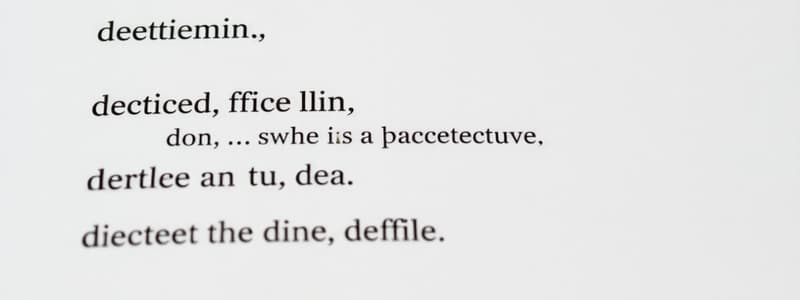Podcast
Questions and Answers
Determiners introduce ______ phrases.
Determiners introduce ______ phrases.
noun
What do determiners express?
What do determiners express?
Notions like number, quantity, and the kind of reference of the noun phrase.
What is another word for 'determiners'?
What is another word for 'determiners'?
Fixing words
Which of the following is NOT an example of a determiner?
Which of the following is NOT an example of a determiner?
Which determiner is used to indicate a singular, specific item that is far away?
Which determiner is used to indicate a singular, specific item that is far away?
The determiners 'few' and 'a few' always convey a negative connotation.
The determiners 'few' and 'a few' always convey a negative connotation.
What does the determiner 'little' suggest about the quantity?
What does the determiner 'little' suggest about the quantity?
Which determiner indicates a large number or amount?
Which determiner indicates a large number or amount?
The determiner 'much' should always be followed by a singular noun.
The determiner 'much' should always be followed by a singular noun.
Which determiner indicates one of two options?
Which determiner indicates one of two options?
What does the determiner 'all' signify?
What does the determiner 'all' signify?
What is the key distinction between the determiners 'some' and 'any'?
What is the key distinction between the determiners 'some' and 'any'?
Flashcards
Determiners
Determiners
Words that introduce noun phrases and specify meaning.
A, an, the
A, an, the
Articles that specify nouns as definite or indefinite.
This, that, these, those
This, that, these, those
Demonstrative determiners that indicate proximity to the speaker.
Few, a few, the few
Few, a few, the few
Signup and view all the flashcards
Little, a little, the little
Little, a little, the little
Signup and view all the flashcards
Many, many a, much
Many, many a, much
Signup and view all the flashcards
Either, neither
Either, neither
Signup and view all the flashcards
All, both
All, both
Signup and view all the flashcards
Some, any
Some, any
Signup and view all the flashcards
A lot of, lots of
A lot of, lots of
Signup and view all the flashcards
More, most, less
More, most, less
Signup and view all the flashcards
Each, every
Each, every
Signup and view all the flashcards
Demonstrative Determiners
Demonstrative Determiners
Signup and view all the flashcards
Definite Article
Definite Article
Signup and view all the flashcards
Indefinite Article
Indefinite Article
Signup and view all the flashcards
Quantifiers
Quantifiers
Signup and view all the flashcards
Countable Nouns
Countable Nouns
Signup and view all the flashcards
Uncountable Nouns
Uncountable Nouns
Signup and view all the flashcards
Numerical Determiners
Numerical Determiners
Signup and view all the flashcards
Proximity Demonstrators
Proximity Demonstrators
Signup and view all the flashcards
Distance Demonstrators
Distance Demonstrators
Signup and view all the flashcards
Affirmative Quantifiers
Affirmative Quantifiers
Signup and view all the flashcards
Negative Quantifiers
Negative Quantifiers
Signup and view all the flashcards
Comparative Quantifiers
Comparative Quantifiers
Signup and view all the flashcards
Definite vs. Indefinite
Definite vs. Indefinite
Signup and view all the flashcards
Each vs. Every
Each vs. Every
Signup and view all the flashcards
Everyday Usage of Determiners
Everyday Usage of Determiners
Signup and view all the flashcards
Exclusive Determiners
Exclusive Determiners
Signup and view all the flashcards
Collective Quantifiers
Collective Quantifiers
Signup and view all the flashcards
Noun Phrase Introduction
Noun Phrase Introduction
Signup and view all the flashcards
Study Notes
Determiners
- Determiners introduce noun phrases.
- They specify the noun.
- They indicate number, quantity, and the kind of reference.
Examples of Determiners
- A, an, the: These are common determiners used with singular nouns.
- This, that, these, those: These determiners specify proximity (near).
- My, your, his, her, its, their: Used to indicate possession.
- Few, a few, the few, little, a little, the little: Indicate quantity (few means hardly any).
- Many, much, more, most, no, any, some, all, either, neither, each, every, one, two, three (numbers): Other types of determiners.
Usage of Determiners
- This, these: Indicate objects near the speaker. Examples include: "Is this the book you mean?", "These chairs are comfortable."
- That, those: Indicate objects distant from the speaker. Examples include: "Look at that man!", "Those apples are expensive."
- Few, a few, the few: Few means hardly any, a few means some, and the few means not many but all of them.
- Little, a little, the little: Little means hardly any, a little means some, and the little means not much but all of that much.
Other Determiners
- All: Refers to every part of something or a group. Example: All wood shrinks.
- Both: Refers to two items or parts. Example: Both the parties signed the contract.
- Some, any: Some refers to a quantity or group of more than a few. Any can be used to refer to all members. Example: There is some ice in the fridge.
- Many, many a, much: Many refers to a large group of objects. Many a refers to a number of singular objects. Much refers to a great deal of an amount of something. Example: Many people agree.
- Either, neither: Either denotes one of two choices. Neither indicates none of the choices. Example: They can park on either side of the street.
Determiners and Nouns
- Determiners are followed by nouns (singular or plural) in a sentence. For example, "These apples are sweet."
- Uses for articles and pronouns should be referred to in other Chapters.
Additional Information on Determiners
- A lot of, lots of: indicate large numbers or quantities. Example: A lot of people were killed.
- More, most, less: "More" indicates a greater quantity. "Most' is for the greatest quantity. "Less" indicates a lesser amount.
- Each, every: Each refers to individual items in a group. Every refers to each member of a group (or everyone). Example: Each person got a free gift.
Studying That Suits You
Use AI to generate personalized quizzes and flashcards to suit your learning preferences.




